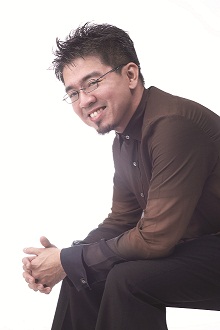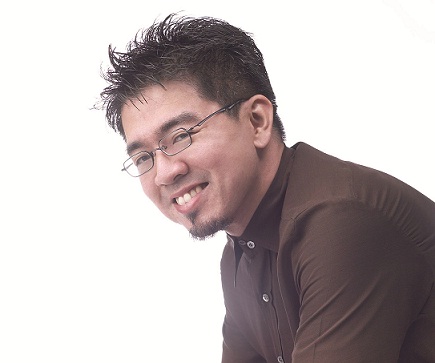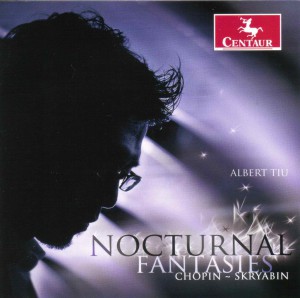By ELIZABETH LOLARGA
 PIANIST Albert Tiu had a lot of practicing to do at the time of this interview, and yet he still managed to send his detailed words on his life. It is a full, hectic life where he can be called on to be at any given time a solo performer, chamber musician, music educator or family man.
PIANIST Albert Tiu had a lot of practicing to do at the time of this interview, and yet he still managed to send his detailed words on his life. It is a full, hectic life where he can be called on to be at any given time a solo performer, chamber musician, music educator or family man.
The Cebu-born, Singapore-based Tiu, who teaches at the Yong Siew Toh Conservatory of Music, will be heard in a unique concert inspired by the four elements of nature: earth, wind, fire and water.
The MCO Foundation production on June 6 at the Ayala Museum lobby has a program of 20 short but rarely heard pieces like Leopold Godowsky’s “The Gardens of Buitenzorg” from Java Suite, Debussy’s “Reflets dan l’eau” from Images I that is characterized by piano rolls, Manuel De Falla’s Ritual Fire Dance, Erik Satie’s “Feu d’artifice” from Sports et Divertissements, Roger Quilter’s transcription of Stephen Hough’s The Fuchsia Tree.
He narrated the genesis of this ambitious program: “Two years ago, I played two recitals at the National Museum of Singapore that was part of a series called ‘Music at an Exhibition.’ These recitals were conceived to be enjoyed alongside the viewing pleasure of a collection of Impressionist paintings from the Musee d’Orsay in Paris. It was a multi-sensory experience to perform in a gallery surrounded by these artworks. Since the theme was Impressionism, it would have been a straightforward, obvious exercise to choose the music of Debussy and Ravel, but I decided to take the road less travelled. If the Impressionist painters number far more than just Monet, Degas, Cezanne and Renoir, I could put together a program which encompasses a wide array of composers who wrote music with Impressionist elements in them.”
He continued, “As I started collecting these pieces, my mind started recognizing certain groupings. There is no shortage of pieces about water. Further investigation revealed catalogues of pieces according to fire, earth, air or wind. Sounds like the’70’s band that had hits like ‘Boogie Wonderland’ and ‘September.’ Perhaps I was being guided by my subconscious. I was not that far removed from having read Dan Brown’s Angels and Demons which features the Vatican cardinals being murdered according to each of the four elements.”
The museum program expands his original idea. He hopes he can turn it into a future recording. He said of the research he did: “It was delightful to have unearthed pieces like Ibert’s Le vent dans les ruines (the wind in the ruins), which I found in the library, and the transcription by Louis Brassin of Wagner’s Magic Fire Music, which I heard in a recording of Josef Hoffman. Speaking of fun, Satie’s Feu d’artifice is so quirky and brief, it almost sounds like a memory lapse!”
Deeply convinced that classical music has a place in the 21st century, he admitted that it faced challenges. He said, “Classical music has always faced the difficult challenge of being relevant in the rapidly evolving modern world. The more time progresses forward, the further we distance ourselves from the source of classical music, which goes back one to three hundred years. The world we live in expects instantaneous results, whether it’s through e-mail, SMS, WhatsApp, Twitter, Facebook. I heard from my sister that postmen in the Philippines have nothing to deliver these days, because hardly anyone uses snail mail anymore!”
Tiu continued, “Composers like Mozart, Beethoven, Chopin, Schumann and Liszt lived during a time when life progressed at a slower pace. Their definition of speed differs from our perception of it today. It is my desire to see musicians and pianists take things slower and be more patient in their work ethic. There is much more to music than just mere speed. The professional industry has become super-saturated with highly proficient pianists and musicians so only a handful make it to the top. We should not be discouraged by this because the idealist in me thinks that financial reward should not dictate how we make music.
If he sounds like the professor that he is, it’s because he considers teaching and performing as complementary. He said, “Doing both makes me practice what I preach and preach what I practice. It is important to have a hands-approach while exploring a piece together with a student. To quote Ralph Waldo Emerson, ‘Life is a journey, not a destination.’ While it is ideal to have a vision for the end result of a piece, the slow process of organic growth is more critical.”
He called classical music “a labor of love because there is no price tag for one’s personal quest for artistic excellence.”

